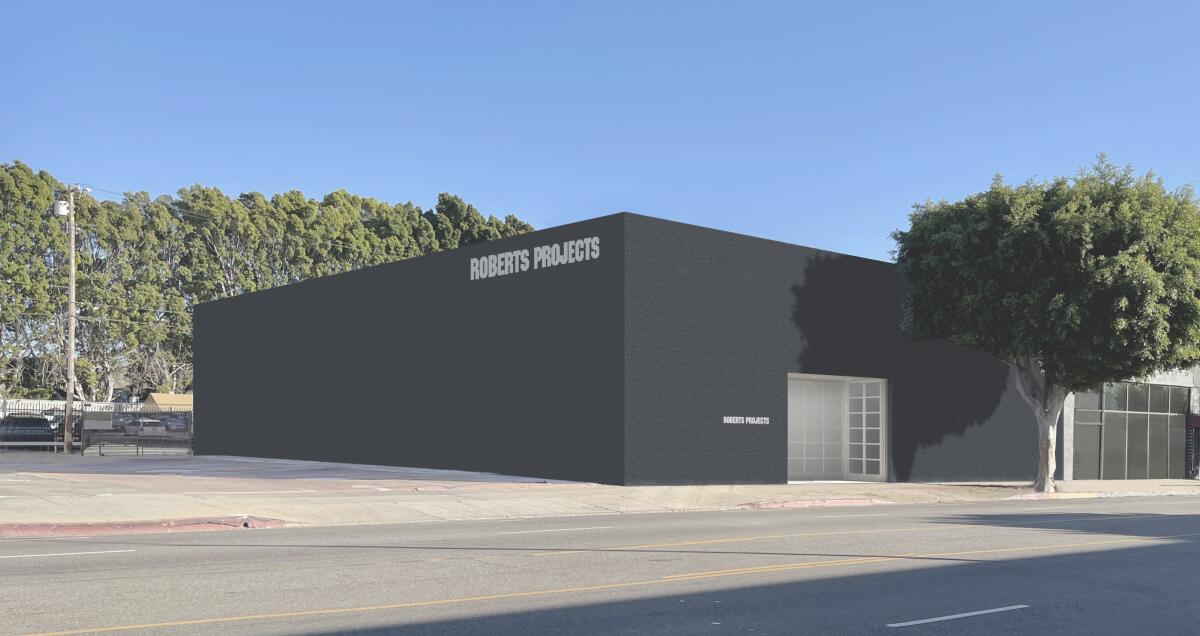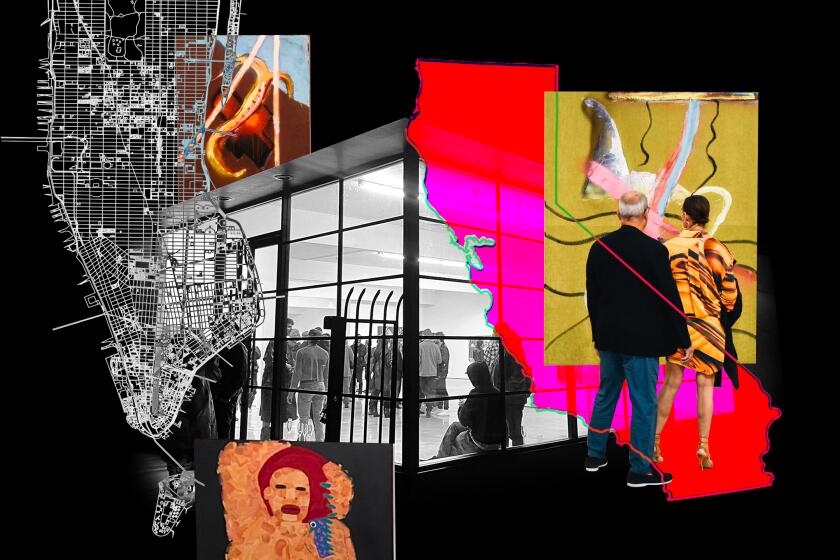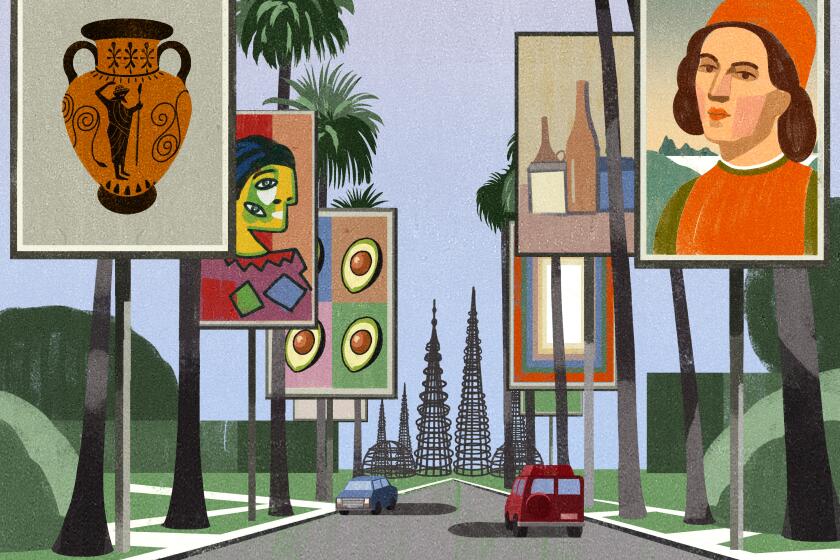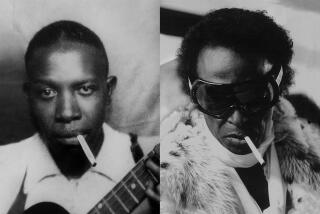Roberts Projects is leaving Culver City, as gallery scene shifts to Central L.A.

The art gallery scene here continues to expand: Culver City’s Roberts Projects is relocating to a new, triple-in-size location in the Hancock Park neighborhood of Los Angeles, punctuating how galleries are coalescing in Hollywood and its environs.
“The energy in Culver City has changed and we wanted to be closer to where the art world was moving towards — which feels like Mid-City,” gallery co-founder Julie Roberts said. “We absolutely needed more space, exhibition and administrative. And for artists with larger archives, we needed a space that was more flexible, so curators could spend more time putting things together.”
Roberts Projects’ new 10,000-square-foot space, at 442 S. La Brea Ave., will premiere in January featuring a permanent “site-specific niche” by 96-year-old L.A. artist Betye Saar as well as an exhibition of new paintings by Kehinde Wiley. The inaugural exhibition, “Kehinde Wiley: Colourful Realm,” will open Jan. 21 featuring portraits loosely inspired by 18th century nature works by Japanese painter Itō Jakuchū.
The new gallery, a former car dealership built in 1948, is by the L.A. architectural firm Johnston Marklee & Associates, which designed the space Robert Projects has occupied since 2008. The gallery was known as Roberts & Tilton until 2018, when it changed its name after partner Jack Tilton died.
‘The question is: Are they moving to L.A. to contribute to the cultural landscape here or to take from it?’ one artist asks.
Last month, the gallery Sean Kelly opened on North Highland Avenue. Earlier this year Pace Los Angeles opened on South La Brea Avenue. The nonprofit art space LAXART is building a new home nearby on Western Avenue that is planned to premiere in winter 2023.
Co-founder Bennett Roberts said his 23 years operating the gallery provides some perspective.
“You used to go to certain galleries to see great shows, but you can see great shows now at a home, a tiny hole in the wall or going to Hauser & Wirth downtown — it can happen almost anywhere and all at the same time,” he said of the L.A. scene. “The quality of what you can see as an audience has become much greater and more developed.”
Saar, who has been with Roberts Projects for more than a decade, has been making installations in nontraditional spaces since the mid-‘90s. For the new Roberts Projects, she carved out a nook, without a door, in a former closet next to a water fountain. She’s still toying with ideas for how to fill the 4-foot-wide, 2-foot-deep and 12-foot-high space. She is considering making an installation of rust objects or a tower of washboards.
“It’s an opportunity to create a site-specific installation within the parameters of the niche,” Julie Roberts said. “In the future, she’d like it to be open, where she could choose an artist or the gallery would invite someone.”
In the gallery’s announcement, Saar said designing the niche was a welcome challenge.
“I am drawn to architectural niches because they are unique and intimate spaces that are usually ignored or overlooked,” she wrote. “Oftentimes they are a strange or odd shape: under a stairwell, in an old closet or a skinny recess between walls. The niche I created for Roberts Projects is situated in a place meant to be discovered. I view the niche as an artistic challenge to create something beautiful and mysterious within it.”
Saar’s latest edition of her Neon installation, “Oasis,” will also be on view when Roberts Projects opens. The work debuted in 1984 at the Museum of Contemporary Art’s Geffen Contemporary, then called the Temporary Contemporary. In the piece, the word “Oasis” glows pinkish yellow.
The new Roberts Projects will include four exhibition spaces and a small bookshop featuring artist monographs and catalogues. That includes a catalogue of Wiley’s work in the January exhibition, his sixth publication with the gallery, and one of Saar’s work, “Black Doll Blues,” in November. The latter will feature artworks related to Saar’s Black doll collection, such as early assemblage pieces and newer watercolors she created during the pandemic. This winter the gallery will publish Ghanaian painter Amoako Boafo’s first monograph.
“We’ve been publishing books for about 20 years now,” Julie Roberts said, “and we felt we were at a place where we really needed to acknowledge the long history of our publications wing.”
That the new gallery space is in a revamped car dealership makes sense for traffic-dependent L.A., Roberts joked. But there’s also a nostalgic factor to the new location, which took four years to find, she said.
“We’re going back to where we first met,” she said of her husband. “Bennett and I have been married 30 years — we met at Burnett Miller Gallery on La Brea.”
These are the 16 must-see works of art from permanent collections at the Huntington, LACMA, the Getty, MOCA, the Norton Simon, UCLA’s Hammer Museum and more.
More to Read
The biggest entertainment stories
Get our big stories about Hollywood, film, television, music, arts, culture and more right in your inbox as soon as they publish.
You may occasionally receive promotional content from the Los Angeles Times.













